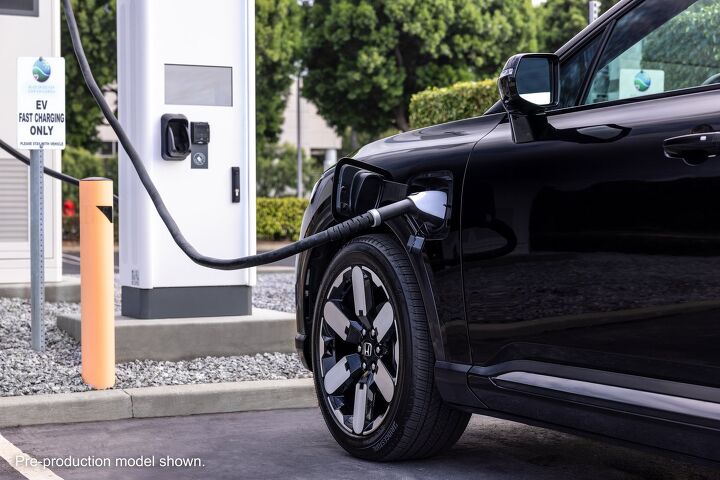
The Honda Motor Company has reportedly been going over prospective plans to build a $13.83 billion facility in Canada that would focus on the production of electric vehicles. Japan’s Nikkei news group broke the story over the weekend, suggesting the site could include on-site battery production that would help the manufacturer with regional content requirements tied to U.S. incentives.
While the federal EV tax credit scheme was never supposed to be an indefinite program, changes made under the Biden administration have allowed manufacturers to continue taking advantage if they can adhere to specific content requirements stipulating that materials and labor be sourced within North America. Meanwhile, Canada has been eager to see more domestic production, has an EV incentive structure of its own, and seems eager to work with Honda.
In fact, the CBC just reported that Honda Global and Honda Canada executives already met with the Canadian government last month and plan to do so again to move the prospective program along.
From the CBC:
This week’s meeting comes after senior executives from Honda Global and Honda Canada met with Industry Minister François-Philippe Champagne and other senior officials last month, according to sources with direct knowledge of the meetings.
Talks are supposed to focus around where the factory would be located (presumably somewhere in Ontario) and how the Canadian government might help. However, Honda isn’t expected to make any decisions until the end of 2024. The manufacturer has remained aloof, stating that it’s considering numerous projects so that it might adhere to its promise of building nothing but all-electric vehicles by 2040. But we’ve seen the EV goalpost shift frequently in recent years across brands, making us hesitant to assume anything.
For now, all Honda has said is that it’s prioritizing its joint venture with LG Energy Solutions in Jeffersonville, Ohio. The site, which broke ground earlier this year, is supposed to help turn the region into a hub for Honda’s electrified products. Assuming the facility is completed on time, production is supposed to commence late in 2025. But it would be a much smaller facility than what’s being discussed for Canada. The Ohio joint venture is supposed to come in around $3.5 billion, with hundreds of millions more going toward retooling existing facilities for EVs.
The hypothetical Canadian plant was, according to NIkkei, was said to represent an investment of roughly $13.83 billion (USD). This is roughly what we’ve seen other automakers pour onto similar concepts designed to adhere to their own electrification promises. But EV sales have begun to slow in recent months and there remains a meaningful subset of the market that simply isn’t interested in them.
Truth be told, plenty of that is bound to be attributable to the present economic conditions. Modern vehicle interfaces are also turning people off. While they’re hardly limited to all-electric vehicles, EVs frequently represent the most egregious examples of what the industry is doing. There are also horror stories regarding battery fires and people trying to get their EVs serviced only to find the dealership has no clue how to handle the situation.
Some of these issues are overblown while others are simply the result of automakers not having established the proper protocols on their new products. Regardless, it’s making it harder to sell all-electric vehicles at a time when most Western governments are doing what they can to force the industry into building them. Numerous European countries (and even a few states in America) have set deadlines to prohibit the sale of newly built gasoline vehicles by 2035. Meanwhile, automakers would like to benefit from the heavy government incentives associated with electric vehicles.
This makes the prospective Canadian facility an appetizing gamble. Honda would be able to localize manufacturing and some of the raw materials it needs for batteries. But it’s still not clear to anybody what the automotive landscape will actually look like in 10 years. EV adoption rates are not keeping pace with industry estimates and previous investments have broadly failed to yield any real profitability. Honda is undoubtedly weighing the odds, perhaps even taking into account the ramifications of a political shift in the Western world. Tomorrow’s leaders may not be interested in electrification and nobody wants to be in the midst of a multi-billion-dollar construction project if deregulation ends EV subsidies and emissions quotas that are effectively driving the project.
It’s a lot for Honda to think about and Canada is assumed to try and sweeten whatever deal it can to add more domestic jobs. Leadership seems eager to frame the nation as a global leader in EV production and the country’s natural resources may actually allow for that. But it’ll probably be months before we hear more about this and perhaps a full year before Honda feels comfortable making a decision.
[Image: Honda]
Become a TTAC insider. Get the latest news, features, TTAC takes, and everything else that gets to the truth about cars first by subscribing to our newsletter.

